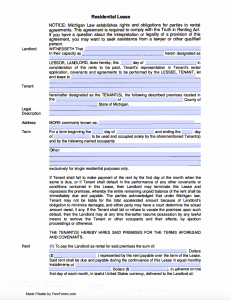
The Michigan lease agreement designates a drafted contract to substantiate the accord involving a property to be rented for a predetermined period and monetary sum. The document further explains confirmed facts of the agreement, reviewing names of the involved parties, property address, residence rules, conditions, pricing, and term of the tenancy. Additional disclosures required by the governing state and federal authorities and are to be submitted within the document and endorsed upon acceptance.
Rental Application – Proffers updated accurate information on a person that is pursuing tenancy with an owner renting a house or apartment. The designated form promotes the accumulation of all data on an individual’s identity, income, and history to make an informed decision to lease to the applying party.

Michigan Association of Realtors Residential Lease Agreement – A standardized Realtors form designed to tabulate the information associated with a real estate rental contract.
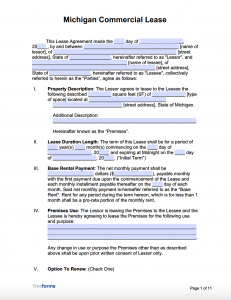
Commercial Lease Agreement – Legalizes the exchange of the use of space for monetary compensation. The involved unit is to be used solely to conduct business.
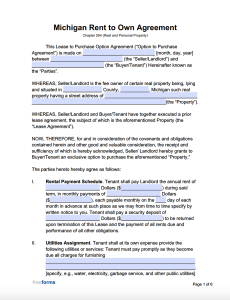
Lease to Own Agreement – Authenticates the concession to transfer the right of use of a property to a tenant for a monthly premium. At the end of the leasing period, the tented is offered the option to purchase.
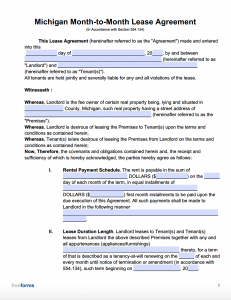
Month-to-Month Lease – Utilizes a rental agreement for a dwelling with an opportunity allowed for either party to get out of the contract prematurely with a minimum of thirty (30) days submitted notice to terminate.
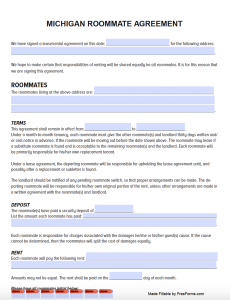
Roommate Agreement – Validates a settlement to utilize a residence in conjunction with other residing individuals for a stipulated financial submission and appointed monthly fee.
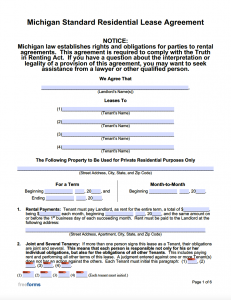
Standard Lease Agreement – Demonstrates the intrinsic commitments entailed int eh arrangement to lease a property for a signified duration period and payment amount.
Sublease Agreement – Enforces a commitment for a subtenant to assume a current tenant’s lease for an outlined period and monthly payment.
All individuals involved in the leasing of property, both owner and tenant, must observe the rules expounded upon in the Michigan Compiled Laws – Chapter 554 on Real and Personal Property.
Identification of the Landlord or Authorized Personel (§ 554.634) – Written leasing paperwork is obligated to include the names and addresses for all property owners and property management representatives.
Move-in Checklist (§ 554.608) – The state of Michigan mandates that a completed inventory checklist must accompany every newly leased residence. The checklist is to be filled and signed by the tenant and returned to the landlord with seven (7) days. The inventory of damage to the home will be utilized for comparison once the lease term has come to an end.
Domestic Violence Victims Rights Disclosure (§ 554.601b) – State statutes require supplemental language be included in the lease agreement or posted on the premises of the property as follows:
“A tenant who has a reasonable apprehension of present danger to him or her or his or her child from domestic violence, sexual assault, or stalking may have special statutory rights to seek a release of rental obligation under MCL 554.601b.”
Truth in Renting Act (§ 554.634) – Supplying notification to the tenant of the obligation of the lease to adhere to the regulation upheld by the Truth in Renting Act is required. Legal compliance can be established by including the following statement in the leasing document:
“NOTICE: Michigan law establishes rights and obligations for parties to rental agreements. This agreement is required to comply with the Truth in Renting Act. If you have a question about the interpretation or legality of a provision of this agreement, you may want to seek assistance from a lawyer or other qualified person.”
Receipt of Security Deposit (§ 554.603) – Property owners requesting a security deposit will need to supply a written record of payment and information regarding the financial institution to hold the funds during the tenancy. The receipt must include the following statement as well:
“You must notify your landlord in writing within 4 days after you move of a forwarding address where you can be reached and where you will receive mail; otherwise your landlord shall be relieved of sending you an itemized list of damages and the penalties adherent to that failure.”
Lead-Based Paint (42 U.S. Code § 4852d ) – The federal government imposes that any house or apartment constructed in 1978 or prior requires additional disclosure to the dangers of lead-composed paints. The possibility of coming in contact with the paint is to be acknowledged via a disclosure form and delivered educational materials on the substance and dangers.
The due date presented in the leasing arrangement should be viewed as the standard for remittance of payment for monthly rental premiums. There is not an instituted grace period on late rental payments backed by the statutes of the state of Michigan.
There is no ceiling regarding how much a landlord can charge for late monthly rental payments. For the fees to be effectively enforceable, it must be stated explicitly within the lease provisions.
State law designates that the fee on NSF checks repaid within seven (7) days cannot exceed $25. For those checks refunded within thirty (30) days, the fee can be no more than $35. Written expression within the lease agreement must outline any costs associated with checks returned on account of insufficient funding. Failure to specify the penalty for a returned check will result in the owner having no legitimate claim to the charge (§ 600.2952).
The limit on the amount a landlord can levy as a deposit for a residence is equal to one and a half months’ rent. Information about the banking institution and location must be printed within the leasing materials (§ 554.602).
After the tenancy lease has expired, the landlord must reimburse the amount of the security deposit within thirty (30) days (§ 554.609). If there is any damage to the property, the same thirty (30) day period applies to the landlord submitting a list of damages and balance of the security deposit to the tenant. When an itemized record of damages is sent to the tenant, it must include the following statement :
“You must respond to this notice by mail within 7 days after receipt of same, otherwise you will forfeit the amount claimed for damages.”
The landlord is permitted to enter the rented premises for remedial or maintenance purposes with advanced notification to the tenant. Although an exact timeframe is not imposed in the state legislature, it is customary to extend at least twenty-four (24) hours of notice before entering (§ 600.2918).